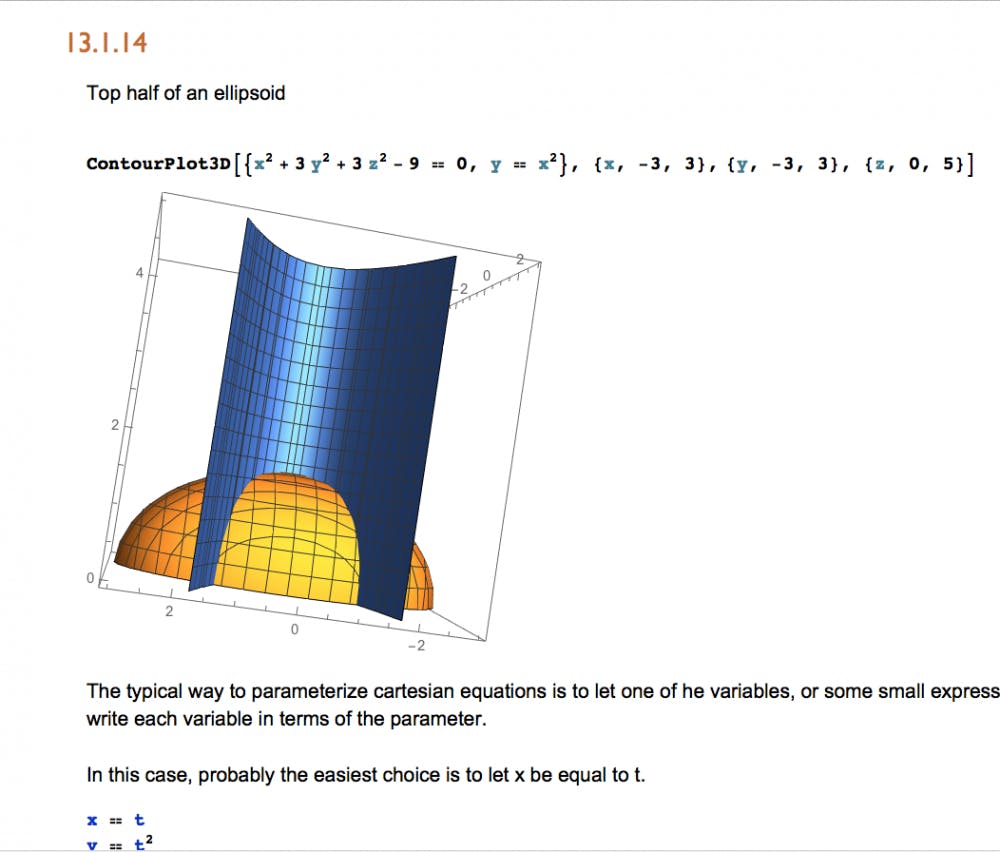With the rise of technology, computer programs and online homework websites have become commonplace in classrooms to help enhance student learning.
Programs such as Microsoft Excel are common in business classes, while lesser-known programs such as Mathematica have a dominant place in Elon’s math classrooms.
And online homework sites such as Cengage, McGraw Hill, Pearson, Moodle and WebAssign are all used by students for submitting homework and getting homework help. Generally, students strongly support these sites.
Stephanie Lobaugh, a senior Statistics major and Mathematics minor, has used Mathematica in multiple different math and statistics courses and enjoys it because it lets her focus on the application of math concepts.
“For me I think it’s been good because I’m more interested in the application of the concepts that I’ve learned in my classes,” Lobaugh said. “So in the real world, I think if you’re applying these methods and concepts you will be using some sort of technology, so it will be helpful.”
Certain Elon math classes such as “Matrix Theory,” “Differential Equations” and “Numerical Analysis,” primarily use Mathematica as a computational and visualization tool, according to Todd Lee, professor of mathematics.
Kristen Mazur, assistant professor of mathematics, uses Mathematica in her “Calculus I” class and finds it lets her focus on the math concepts instead of the calculations.
“Before using Mathematica I focused a lot on lots of examples of doing a lot of algebra, of doing complicated derivatives by hand,” Mazur said. “But now it’s more, ‘Let’s really think about what a derivative is and what it means to be a derivative.’”
While math students use Mathematica, business students use online homework sites such as McGraw Hill and Cengage, and most students use programs such as Microsoft Excel in their classes as well.
Kelly Porter, a sophomore accounting major, has used both online websites from McGraw Hill and has become Excel certified.
“These online programs that textbooks have now really help us practice the problems,” Porter said. “So instead of just reading it and seeing pictures of it, you can do hands on experience and actually practice the problems. I think it’s a lot easier to learn that way.”
According to Catherine Chiang, associate professor of accounting, online sites such as Cengage and McGraw Hill became popular in 2007-2008. The programs are there for students to do their homework on and receive immediate feedback about questions they got wrong and how to fix their answers.
“It’s a personalized, individualized learning system, which is really good,” Chiang said.
But there are concerns that students aren’t learning how to do calculations as well as they should be. According to Chiang, the technology often gives students prompts during their homework, and sometimes students rely too heavily on those prompts to be able to perform calculations.
“It takes away the thinking part of it from students,” Chiang said. “When I give them a blank sheet of paper and ask them to do something without prompt, some of them don’t know how to do it. So I think that’s the negative part.”
While some students struggle on tests to perform calculations by hand without a prompt, Ray Brown, a junior Finance and Accounting double major with a minor in Economics, makes sure he doesn’t rely too much on the programs to learn the material.
“I can calculate it all by hand, and it’s not an issue for me,” Brown said. “I always make sure I understand the formula before I use Excel. I kind of use technology as a wall to lean on. It’s nice and helpful when I need it, but I don’t need it to get the correct answers.”
Mazur said she and the other faculty do their best to strike a balance between doing calculations by hand and using Mathematica.
“This is something that we as a department are thinking about,” Mazur said. “The idea is let’s find the balance. Where is that limit. What’s the minimum you need to do by hand to understand things before we can move to Mathematica?”
But knowing how to use programming technologies like Mathematica is a good skill to have for after college.
“One of the No. 1 skills employers want is programming skills,” Mazur said. “Knowing those computer programming skills makes you that much more marketable on the job market.”
As for the online websites, they’re a way for students to engage in the class material without being limited by not having access to immediate feedback.
“What I see is that students using technology to get familiar with different interfaces and train them to know that there are a whole lot of resources out there,” Chiang said. “They should not limit their pursuit of knowledge to the classroom.”


